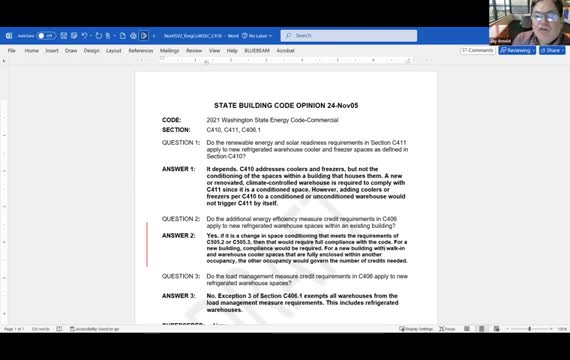MVPE committee approves King County opinion slate on commercial energy code; committee debates how to treat Initiative 2066
Get AI-powered insights, summaries, and transcripts
Subscribe
Summary
The MVPE committee approved two packs of interpretive opinions (November 3 and November 4 sets) on commercial energy‑code questions covering hot‑water system sizing, waste‑heat sources and initial tenant‑improvement scenarios and discussed the interplay of Initiative 2066 with committee opinions.
The MVPE committee of the State Building Code Council approved a slate of interpretive opinions on commercial energy‑code questions from King County and other petitioners during its Feb. 17 meeting, and members discussed how a recently adopted state law (Initiative 2066) intersects with committee opinion work.
The committee voted to approve two separate sets of written opinions: a November 4 package addressing questions about hot‑water systems, primary versus supplemental capacity, and tenant‑improvement scenarios; and a November 3 package of opinions focused on system capacity, waste‑heat sources and how to calculate compliance capacities for heat‑pump systems. The committee also approved related wording changes recommended in discussion.
Legal context and debate
A number of speakers raised Initiative 2066 (a voter‑approved statute), asking whether that law, pending litigation in some forums, affects the committee's ability to issue opinions on currently adopted code provisions. Patrick Hanks (Building Industry Association of Washington) reminded the committee that "law supersedes code and that 2066 has gone into effect. There are no stays, so there's no question about whether or not it apply it is currently in effect."
Chair Jay Arnold said the committee would treat its role narrowly as issuing opinions on the code as it currently exists. "I do not wanna have this committee meeting turn into a debate on initiative 2066," Arnold said, adding that the committee must interpret the adopted codes while litigation proceeds.
What the committee approved
- King County November 4 opinions (C404 series): The committee reviewed and accepted several Q&A responses on system sizing, the role of initial tenant improvements, and when a new fossil‑fuel hot‑water system must stand alone rather than rely on a building's central heat‑pump system. Staff and members discussed C406.1.1.2 and related provisions that allow initial tenant improvements to be part of a larger building system in some circumstances. The committee moved and approved the entire November 4 slate by voice vote.
- November 3 opinions (C404 & related): The committee also approved the November 3 set after a brief discussion about waste‑heat recovery, solar thermal and how to treat integral storage in system capacity calculations. Committee members recommended that the published answers explicitly reference the exception language in C404.2.1 and clarify that approved waste‑heat sources (including solar thermal and wastewater heat recovery where the code lists them) may be considered when calculating a project's compliance.
Substantive highlights and technical clarifications
- Waste‑heat recovery and approved sources: Committee members agreed to add explicit references to the exception in C404.2.1 and to list common approved waste‑heat sources (solar thermal, wastewater heat recovery and condenser/steam recovery where applicable) so designers know those pathways are available to achieve compliance credits.
- Initial tenant improvements: The committee clarified that an initial tenant improvement can sometimes use the shell and core system if that system was designed and permitted to serve the tenant area, but a standalone new fossil‑fuel hot‑water system installed solely for the initial tenant improvement will generally be treated as a separate system for compliance.
- Capacity, storage and real‑world performance: Several members raised design and operational concerns. Larry Andrews and other practitioners warned that lab ratings and rated COPs can be misleading in cold, humid climates because defrost cycles and storage losses reduce real output. Committee members noted the code already includes conservative expectations (for example, primary heat‑pump capacity may be expected to deliver a reduced share at very low ambient temperatures) and asked staff to ensure the opinions reflect these operational realities.
Committee motions and votes
- The committee moved and approved the November 4 slate of opinions (motion by Kjell; seconded; voice vote recorded as aye), then recessed and returned to consider the November 3 slate, which it also approved (motion by Kjell; seconded by Ben; voice vote recorded as aye).
Next steps
Staff reported receipt of more than 150 code‑change petitions for the commercial energy code and said the petitions will be vetted for completeness and provided to the council packet for the next full SBCC meeting. Members asked staff to ensure the newly approved opinions explicitly cite the exception in C404.2.1 where appropriate and to add clarifying language on how waste‑heat and storage are considered in capacity calculations.
Ending
After approving the November 3 and November 4 opinion packages, the committee recessed briefly, returned and completed the rest of its agenda; the meeting adjourned after other business and public‑comment opportunities.
